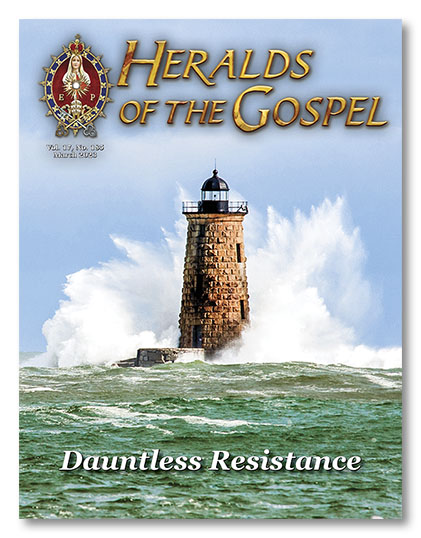An old proverb rightly states that “weak men create hard times.” If this is so, the problems of the current age can be understood… Scenes that promote the culture of victimhood, such as reporters crying on live television or parents afraid to reprimand their children, would have been unthinkable until recently. We are immersed in an increasingly “anesthetized”, cowardly and hedonistic world, in which the avoidance of suffering and the maximization of pleasure seem to be the very meaning of life.
Such a situation cries out for the practice of one of the most vilified virtues in our days: fortitude, without which the soul becomes lazy, timorous and mediocre. It is an essential virtue because, according to St. Thomas Aquinas, it is a condition for all the others; indeed, the term virtue comes from the Latin virtus, which is equivalent to power or strength. Plato held that courage was virtue by antonomasia.

As virtue a se, fortitude, on one hand, resists fear and, on the other, advances with audacity. In this sense it operates, according to Plinio Corrêa de Oliveira’s vision, in the manner of a “spring”, by its resistance, and of a “sword”, by its attack – in Latin aggredi. According to Aquinas, contrary to what it may seem, the “spring” dimension of fortitude demands greater effort than the “sword”, because it is of longer duration and is generally at a disadvantage in the struggle and in very real and present danger.
All the Saints practiced the virtue of fortitude to a heroic degree in both of its modalities. With regard to the “sword” of the spirit (cf. Eph 6:17), it is enough to recall the courage of the first Jesuits in the face of the antagonism of the forces of evil, the bravery of Bishop von Galen in his anti-Nazi sermons, and the intrepidity of La Valette during the siege of Malta, as we read in the pages of this issue.
However, the resistance mode – “the spring” – appears much more among virtuous souls, precisely because it is multiform and longer-lasting. It is distinguished in the martyrdom of countless faithful who stood firm in the face of the persecutors’ assaults, and it is related to perseverance, which resists the worst adversities, as well as to patience, which, according to the Angelic Doctor, is the root and guardian of all virtues.
As pointed out by Dr. Plinio, we can observe in the Revolution certain traits that simulate the flexibilities of the “spring” and, in most cases, its clashes with the Counter-Revolution occur on the “spring” plane, that is, in a dispute of resilience and resolution.
Sometimes the struggle between “springs” is interrupted by moments of “swordplay”, when the battle escalates. The “spring” of good is pressured in such an overwhelming manner that it bursts forth with the momentum of accumulated resistance. On such occasions the great tournants of history ensue, like the Resurrection of Christ, when the stone of the Sepulchre was forcefully cast aside.
The proverb quoted at the beginning continues: “Hard times create strong men.” Indeed, in the most painful historical period of all, during the final struggle against the Antichrist, every believer will become, in St. Ambrose’s interpretation, “a sharp two-edged sword” (Rv 1:16) issuing from the mouth of Christ, according to the vision of the Apocalypse. It will be the retribution for all the “spring” moments of history. ◊

